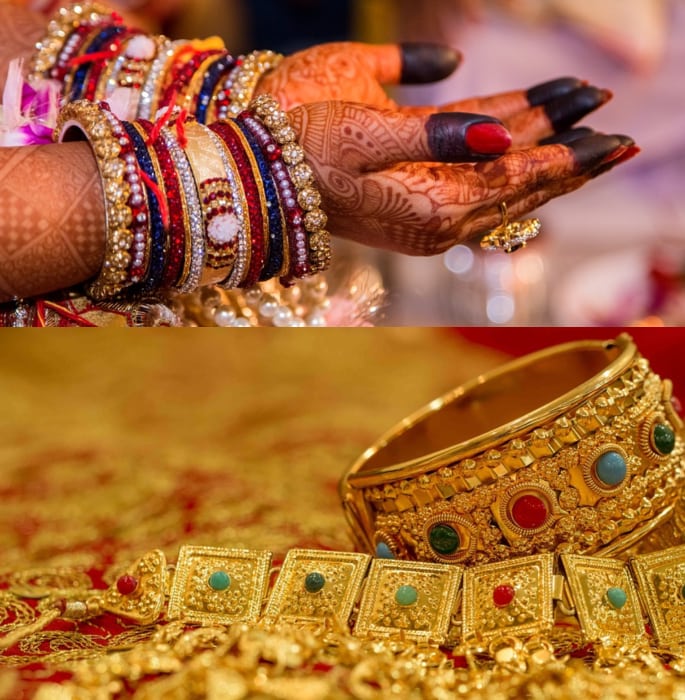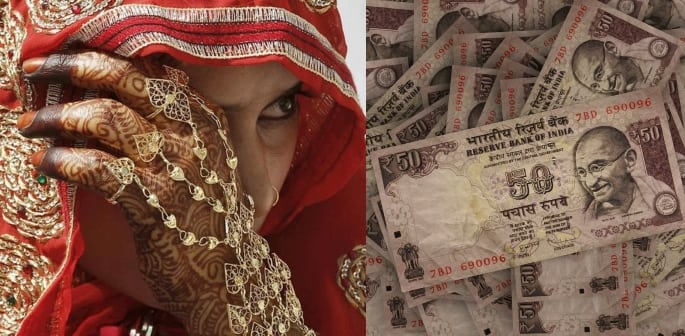"A few days after their marriage, Naeem started beating her up, demanding dowry."
The term ‘death by dowry’ is widely-used to describe a bride either committing suicide or being murdered as a result of dowry harassment.
According to the National Crime Records Bureau, 7,634 women died due to dowry harassment in 2015. Rather alarmingly, this is the equivalent of 20 women dying every day.
A dowry refers to the money, goods, or estate that a woman brings to her husband or his family when the couple marry. The sum of the dowry is normally agreed before the wedding.
Often provided by the parents of the bride, a healthy dowry can act as an incentive to marriage. It is most commonly practised in countries where families live in extended groups.
As the bride will often reside with the family of her new husband following their marriage, the money or gifts are exchanged for the bride staying with the husband and his family.
Whilst seeking a dowry was legally outlawed in 1961, banning the long-running practice has been difficult to enforce and many families still expect to receive a dowry.
In some cases, fights and altercations can break out between families over the dowry. If these disagreements aren’t resolved, circumstances for the bride can become fatal.
We look at five real and tragic stories of death caused by dowry.
Anissia
The first real story of ‘death by dowry’ is that of 39-year-old Anissia Batra.
An air hostess for Lufthansa, in February 2016, she married Mayank Singhvi, an investment banker. However, Anissia’s idyllic imagining of a marriage was not to be realised.
In a statement made by Anissia’s mother, Neelam, she described how the violence in Anissia and Mayank’s marriage began on the second day of their honeymoon in Dubai.
Based on quotes from the Times of India, she said:
“She kept messaging me the entire night. The next day, she left the hotel and went to her friend’s house. From there she went to the airport and returned to India.”
Neelam added that she had advised her daughter to speak about the matter with her in-laws.
However, just a week after this, it is claimed by Batra’s family that Mayank returned to their home in Delhi one day, drunk, where he beat her up again.
In April 2018 the violence worsened. Anissia’s mother came to see her daughter on 14th April in Delhi after she complained about the violence in her marriage.
Not long after, Neelam saw and experienced the extent of the violence for herself. Mayank returned home on 6th June and allegedly beat up both Anissia and her mother.
The next day, Mayank’s parents travelled to see the couple where it is claimed that they asked Anissia and Neelam to leave the house.
Two days following this encounter, Anissia’s father became involved. With both families in Delhi, it is alleged that they resolved the matter and reconciled.
As a result, Anissia’s parents left Delhi and returned to Chandigarh on 29th June.
Despite this, it was not long before Anissia suffered violence from her husband again. On 13th July, it is claimed that she text her mother saying Mayank had beaten her up again.
Anissia added that at the time of the texting, she was in another room to her husband. Neelam said:
“At 12.11pm, I texted her back asking about her well-being. She didn’t reply. I received two calls and abusive messages from Mayank after that.”
Around 3pm on the same day, Anissia’s father learnt of her suicide and informed her mother.
It is thought that Anissia jumped to her death. Jumping from the terrace of her residence in south Delhi’s Panchsheel Park.
The couple’s neighbours added that they heard loud noises coming out of the house on the day that Anissia died.
One neighbour, Amar Pal Kohli also commented that Anissia had even lived separately to her husband following the frequent altercations.
The brother of Anissia, Karan Batra, came forward and claimed that Mayank’s family had been demanding dowry and torturing Anissia since their marriage began.
Whilst it is unclear whether Anissia took her own life or was in fact murdered by her husband, Karan alleged that she was murdered. He said:
“Moments before she died, she had texted that she was taking a big step. Later, we got to know about her death.”
A second autopsy of Anissia’s body is due to be conducted to determine if her death was a suicide or murder.
Razia
Razia married Naeem Khan in 2005. Expecting a happy marriage, Razia soon discovered her husband’s violent tendencies.
According to Firstpost, it was not long before Naeem began to beat her. On top of this, it is also alleged that he denied his wife the basic necessities to live.
She was locked up by her husband for over a month in his house. During this time, the police said that Naeem refused to give her food or water.
In what can only be described as a painful and dragged out death, it is believed that her husband left her like this after giving her triple talaq (instant Islamic divorce) over the phone before he locked her away.
Her family said that whilst Razia was rescued from her husband’s home two months ago with the help of an NGO, she did not improve. She died on 10th July while on her way to a hospital in Lucknow.
Two days later, on the 12th July, Razia’s in-laws registered a case of dowry death against the deceased’s husband.
The victim’s sister, Tara, has alleged that Razia was regularly beaten by her husband over dowry.
Tara, Razia’s eldest sister claimed that Naeem had tortured her sister since the beginning of their marriage. She said:
“My sister Razia got married to Naeem Khan in 2005. A few days after their marriage, Naeem started beating her up, demanding dowry. In April, Naeem divorced her over phone.
“He returned home after a few days and then locked her in a small room at his house and did not even give her food or water.”
According to the police, Naeem has claimed that he and Razia were still married. He added that he did not divorce Razia.
However, he did say that since his in-laws had registered a case of dowry against him, he had distanced himself from Razia.
The superintendent of the Police, Abhinandan Singh said:
“Her husband Naeem who runs a chappal (slipper) factory was arrested on Friday and sent to jail.”
This case of dowry harassment is undeniably cruel. Naeem allegedly left her to die slowly after refusing her even water.

Salsha
20-year-old Salsha cut her education short when her parents announced that they had found her the perfect husband, Roshan.
As the daughter of a Gulf-based businessman, the groom demanded a large dowry for his bride. Her family agreed. After all, he was a great match for her.
At the time of the wedding, the groom demanded 1 kg of gold, an expensive car and land as the dowry requirement. The bride’s family accepted the demands and provided the groom with them.
The police even confirmed that additional gifts, as well as the dowry, were given to the groom. But this still wasn’t enough.
Drenched in layers of gold jewellery for her wedding day, Salsha looked happy on her big day. But it wasn’t long before her happiness crumbled.
The greed of the groom grew and it is alleged that his demands for more dowry increased until Salsha couldn’t handle any more.
According to the police, just three months after their wedding, Salsha took her own life.
On 11th July, she was found in her husband’s house in Venjaranmoodu in Kerala’s Thiruvananthapuram.
According to the News Minute (TNM), the post-mortem found that her death was caused by hanging.
Attingal Additional Superintendent of Police Adithya said that the deceased’s brother was first to suggest the case was linked to dowry harassment. He said:
“It was her brother who first complained about it being an alleged case of dowry death. He gave the police a statement.
“There were no signs of physical abuse. Her parents have alleged that Roshan and his mother made repeated demands for more dowry.”
The police booked Roshan and his mother under Section 304 (b) (dowry death).
Salsha’s husband who is also a Gulf-based businessman, went missing after her death, in an attempt to hide from the police.
He later surrendered to the police after his anticipatory bail plea was denied by the Kerala High Court.
The police added that his mother continues to hide from them.
Madhuri
Madhuri Devi, a 35-year-old wife and mother married her husband, Gulab Singh in 2009.
Despite being married for so long, this would not save Madhuri and even their own child from the violent wrath of her husband.
In a statement made before her death, Madhuri said that her husband had been harassing her for more dowry money since they were married over eight years ago.
It is alleged that Gulab demanded that she bring him Rs 50,000 from her father. However, Madhuri denied satisfying his greedy demands.
Despite denying him for so long without consequence, Gulab seemed to have finally acted out in the most violent way possible.
In October 2017, the mother and daughter were allegedly killed together in the Gaighat police station area of the Bela Gopi village.
According to the police, Madhuri and her 6-year-old daughter Ananya, both died of burn injuries at the Sri Krishna Medical College and Hospital in Muzaffarpur.
Quoting Madhuri’s statement, Ahiapur Station House Officer, Vijay Kumar said:
“Gulab Singh used to beat Devi frequently for dowry. On Saturday night, he came home under the influence of liquor, tied her to a wooden cot and set her on fire. When Ananya started crying he threw her into the fire.”
Officials at Ahiapur police station in Muzaffarpur town recorded her worrying statement. Following this, they registered a case against her husband along with his father Laxmi Singh and his mother.
The police brought a case against the family under sections 498A (husband or relative of husband of a woman subjecting her to cruelty), 304B (dowry death) and 302 (murder) of the Indian Penal Code.
According to the police, all of the accused individuals absconded.
The most abhorrent part of this real story seems to be that Gulab’s greed overwhelmed not just his love for his wife, but even his own daughter.
Somera
Before 22-year-old Somera Bibi could marry, her future husband’s parents demanded a large dowry.
According to the Telegraph, Somera’s in-laws wanted Rs 100,000 (the equivalent of £1,000) because of her dark skin.
Her in-laws wanted such a large sum simply because they considered her skin to be too dark.
Ever since the couple married, Somera’s family were forced to keep paying the family money as compensation for her complexion.
Since the couple married, Bibi’s family had given Somera’s in-laws a further Rs 250,000. At this point, the family were broke and could no longer afford the dowry demands.
After a fight on 3rd June 2018 over the dowry payments, members of her husband’s family had come together and locked Somera in a room.
It is alleged that Somera’s husband, his three brothers, and his mother then poured kerosene onto her and left her to die in the fire.
Neighbours were alerted to the horrific scene after seeing smoke and hearing Somera’s screams. The 22-year-old was taken to a hospital but sadly later died of her wounds.
On her deathbed, Somera was able to report what had happened to the West Bengal police. She reportedly said that she had protested against the extortionate treatment of her family.
As a result, her husband’s family had attacked her.
Somera’s brother, Khayer Hossain, spoke to the Calcutta Telegraph, he said:
“For the first time, with her back to the wall, she started protesting. She said enough money had been given for the colour of her skin and there was none left to give. They wouldn’t listen.”
He added:
“They wanted to get him married to someone fair.”
According to a police report, Somera’s mother, Tandila Biwi, claimed that her daughter’s husband beat her regularly and Somera was often told by her husband and his family that her skin was too dark.
Tandila alleges that they said things like:
“You are dark. We don’t want you in the family.”
Somera’s husband and his relatives are thought to have absconded. They took with them Somera’s two-year-old son.
These 5 true stories are deeply shocking, yet cases of dowry death remain prevalent in India.
Whilst being illegal, not only is the practice still widespread but there are no signs of it abating. Sadly, even in the UK, stories of dowry-based violence are also common.
The running trend across all of these real stories is the amount of greed that takes over these men and their families.
They become obsessed with dowries and the continual flow of money and wealth that they provide.
Whether these women have been driven to suicide or been murdered by their in-laws over dowry demands, the tragic consequences of dowry harassment are clear.






























































